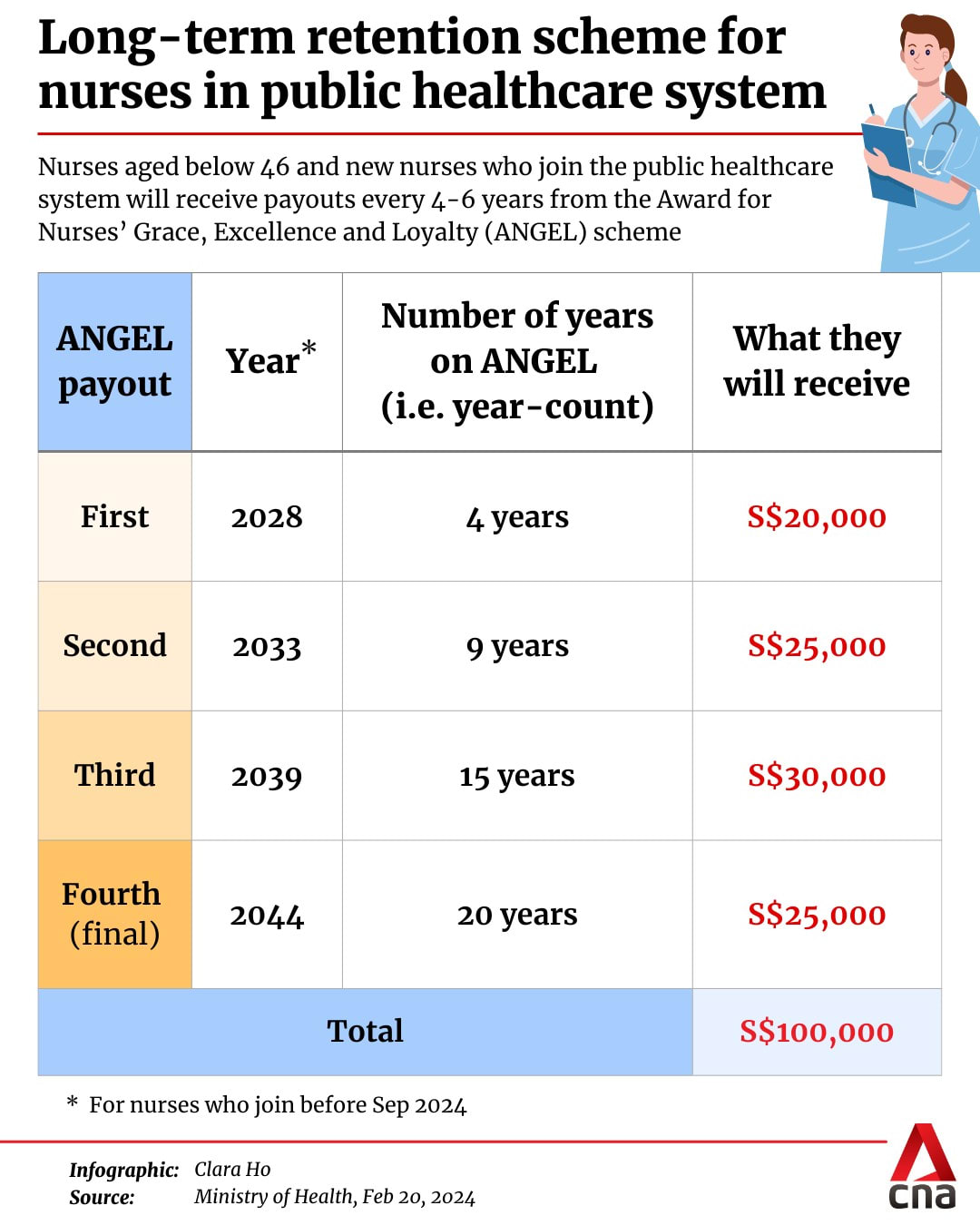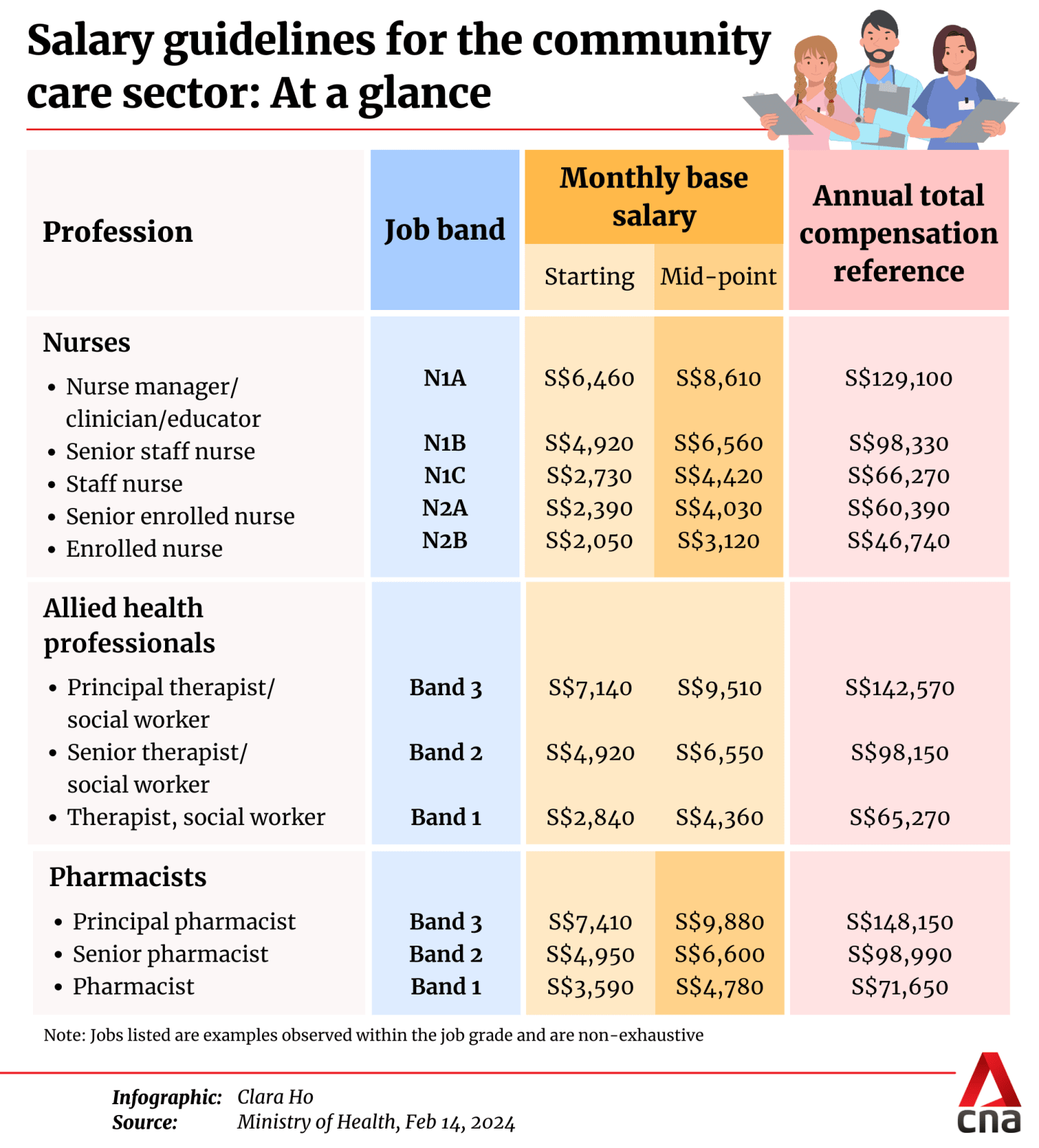New nurse retention scheme a 'reason to stay' but payouts not substantial enough, some say
Under the retention scheme, nurses in the public healthcare system can each receive up to S$100,000 over 20 years, or up to the prevailing retirement age.

Healthcare workers in a hospital. (File photo: iStock/xavierarnau)

This audio is generated by an AI tool.
SINGAPORE: Filipino nurse Benj, who started working in a public hospital in Singapore last year, had set his sights on moving to Australia or the United States someday for work.
But the announcement of a new retention scheme that would see nurses in Singapore receiving up to S$100,000 (US$74,500) over 20 years gave him a “reason to stay”, he told CNA.
The initiative, known as the Award for Nurses’ Grace, Excellence and Loyalty (ANGEL), was announced on Tuesday (Feb 20) by Health Minister Ong Ye Kung. About 29,000 nurses in the public healthcare system will come under the scheme.
New nurses and those aged below 46 will receive S$20,000 to S$30,000 every four to six years. Older nurses who have worked for at least five years will receive S$5,000 to S$15,000 upfront, and they will then be placed on an accelerated payout path.
The scheme is also open to foreign nurses after they have served for four years in Singapore’s public healthcare sector.
“The retention scheme is a good way to show recognition and appreciation to us nurses, working in government institutions here in Singapore,” said Benj, who wanted to be known only by his first name.
“This gave us a reason to stay and serve happily in the frontline,” the 31-year-old surgery ward nurse said, adding that the monetary benefit is a “good reward” especially in light of global competition and demand for nurses.
He added that he “felt the support and appreciation” of the Singapore government through the initiative.

RECOGNITION OF HARD WORK
Including Benj, all five nurses CNA spoke to generally welcomed the retention scheme as a recognition of their hard work and long hours put into caring for patients.
Ms Emily Yap, a Singaporean senior staff nurse in the geriatric department at Alexandra Hospital, hopes the retention scheme will encourage her colleagues to persevere in their careers.
“The nursing profession is noble, and I feel motivated to embrace challenges and assume greater responsibilities in my career,” said the 24-year-old, who has been a nurse for about three years.
Ms Yap also said it was a crucial time to launch the scheme, given that Singapore is expected to reach “super-aged” status by 2026 and would require more healthcare workers to cater to the ageing population.
A country is known as “super-aged” when the proportion of its population aged 65 and above hits the 21 per cent mark.
Singapore's need for nurses is also growing due to the increasing complexity of health conditions, said Associate Professor Elaine Siow of the Singapore Institute of Technology (SIT).
The ANGEL scheme will help ensure a stable nursing workforce as nurses may think twice about leaving the profession, she said.
Pay raises for nurses were implemented earlier, but these were aimed at rewarding good performance while the scheme targets the retention of manpower, said Assoc Prof Siow, who is the programme leader of SIT's bachelor's and master's nursing degrees.
She also noted the important role foreign nurses play in the public healthcare sector.
“The impact of their contributions was felt during the COVID-19 pandemic when most left Singapore for various reasons,” she said, adding that many dedicated foreign nurses have served for years in Singapore.
“For many of them, they have left their families behind to work in Singapore. I believe it is timely for us to recognise their contributions.”
Public hospital nurse Sarah (not her real name), told CNA that many foreign nurses are leaving for Australia and New Zealand as these countries offer sign-on bonuses and allow their families to migrate together with them.
“That is the main attraction that Singapore does not offer to our talented foreign nurses. It is about time that the government is doing something to retain talented and experienced nurses,” said the nurse, who is a Singapore permanent resident.
SCHEME "FALLS SHORT" IN SOME AREAS
But Sarah and some nurses CNA spoke to pointed out they have to wait four to six years for each payout and that the incentive does not apply to those in the private healthcare sector.
Sarah, who has been a nurse for 10 years, acknowledged that the retention scheme serves as an “additional boost” on top of existing benefits.
But a S$20,000 payout over four years means S$5,000 a year, or just S$417 per month.
This is “close to” the amount a locum or stand-in nurse receives in one shift, Sarah noted. “I feel that it is the main reason why nurses are speaking up; (they do) not consider it a substantial amount,” she said, pointing to comments from fellow nurses on social media.
To this, SIT's Assoc Prof Siow said: “It is difficult to put a specific amount on what is considered a sufficient payout for nurses.
“At first pass, the amounts do look generous, but it must be understood that these payouts happen every four to six years,” she said.
“Some nurses may forgo the amounts if they have better opportunities elsewhere or prefer to leave the workforce for personal reasons – such as to take care of family or children – despite the loss of these payouts.”
Janet (not her real name), a home care nurse working at a community care organisation, also told CNA that while she appreciates the Health Ministry’s initiative to retain nurses, she believes it “falls short”.
“Nurses need an annual salary increase with a minimum cap. We are underpaid, considering the hard work we put in to meet patients' needs and deliver quality care,” said the 36-year-old who has been a nurse for more than 10 years.
Publicly funded community care organisations and social service agencies can also apply to participate in the scheme. They will need to co-fund the awards, with most of the funding coming from the government, Health Minister Ong Ye Kung said on Tuesday.
Private hospitals, however, are not included in the scheme.
“I would be grateful if such schemes are given to private sectors as well. As nurses, be it in the government or private sector, the job is equally stressful and lacks staff welfare,” said Mr Staffan Stewart, a nurse working in a private hospital.
“I do hope that private hospital nurses will also be recognised for their hard work,” added the 31-year-old.
Mr Stewart also wanted to see that the welfare of all healthcare workers, and not just nurses, improve gradually.
“If not, it’s painful to see our locals moving away to other countries just to get the life they are unable to live in Singapore.”
Nurses also told CNA that there is more to retaining the workforce than money.
“Beyond monetary compensation, nurses require adequate rest, a safe working environment, protection from healthcare worker abuse, and opportunities for promotion and career progression within the health organisation,” said Alexandra Hospital nurse Ms Yap.
Likewise, Assoc Prof Siow highlighted that nursing attrition is a multi-faceted issue which “cannot be addressed just by one solution”.
“The pull factors for remaining in the profession are not entirely monetary. There are other factors that should be considered such as work conditions, passion for the job, regard for the profession, opportunities for upskilling and opportunities for career progression,” she said.
“Beyond implementing measures to retain nurses, we need to continue efforts to grow the nursing workforce by getting more people to consider nursing as a career.”

















